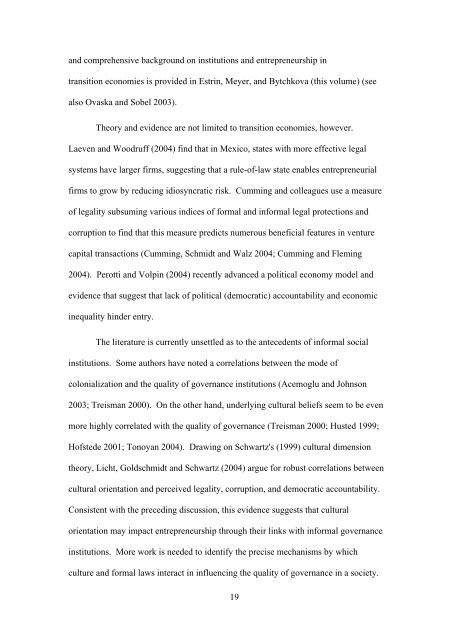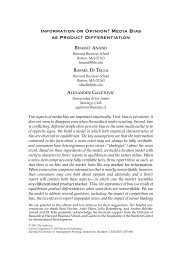Social Dimensions of Entrepreneurship. - People. hbs .edu ...
Social Dimensions of Entrepreneurship. - People. hbs .edu ...
Social Dimensions of Entrepreneurship. - People. hbs .edu ...
You also want an ePaper? Increase the reach of your titles
YUMPU automatically turns print PDFs into web optimized ePapers that Google loves.
and comprehensive background on institutions and entrepreneurship in<br />
transition economies is provided in Estrin, Meyer, and Bytchkova (this volume) (see<br />
also Ovaska and Sobel 2003).<br />
Theory and evidence are not limited to transition economies, however.<br />
Laeven and Woodruff (2004) find that in Mexico, states with more effective legal<br />
systems have larger firms, suggesting that a rule-<strong>of</strong>-law state enables entrepreneurial<br />
firms to grow by r<strong>edu</strong>cing idiosyncratic risk. Cumming and colleagues use a measure<br />
<strong>of</strong> legality subsuming various indices <strong>of</strong> formal and informal legal protections and<br />
corruption to find that this measure predicts numerous beneficial features in venture<br />
capital transactions (Cumming, Schmidt and Walz 2004; Cumming and Fleming<br />
2004). Perotti and Volpin (2004) recently advanced a political economy model and<br />
evidence that suggest that lack <strong>of</strong> political (democratic) accountability and economic<br />
inequality hinder entry.<br />
The literature is currently unsettled as to the antecedents <strong>of</strong> informal social<br />
institutions. Some authors have noted a correlations between the mode <strong>of</strong><br />
colonialization and the quality <strong>of</strong> governance institutions (Acemoglu and Johnson<br />
2003; Treisman 2000). On the other hand, underlying cultural beliefs seem to be even<br />
more highly correlated with the quality <strong>of</strong> governance (Treisman 2000; Husted 1999;<br />
H<strong>of</strong>stede 2001; Tonoyan 2004). Drawing on Schwartz's (1999) cultural dimension<br />
theory, Licht, Goldschmidt and Schwartz (2004) argue for robust correlations between<br />
cultural orientation and perceived legality, corruption, and democratic accountability.<br />
Consistent with the preceding discussion, this evidence suggests that cultural<br />
orientation may impact entrepreneurship through their links with informal governance<br />
institutions. More work is needed to identify the precise mechanisms by which<br />
culture and formal laws interact in influencing the quality <strong>of</strong> governance in a society.<br />
19
















